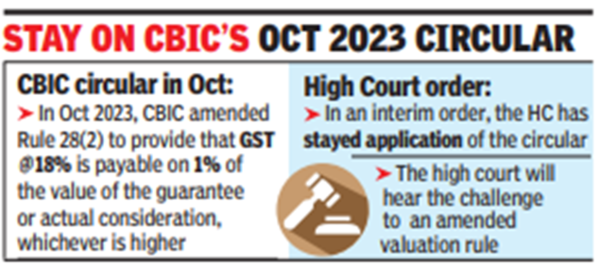Relief for India Inc as HC Stays GST on Corporate Guarantees

In a significant development for the corporate sector, the Punjab & Haryana High Court has issued a stay on a circular that imposed Goods and Services Tax (GST) on corporate guarantees provided by holding companies for the benefit of their subsidiaries. This interim order provides respite to India Inc. from the burden of GST demands, offering a temporary reprieve until further legal clarity is established.
Background: Circular by CBIC
Last October, the Central Board of Indirect Taxes and Customs (CBIC) issued a circular that categorized corporate guarantees provided by holding companies to banks or financial institutions for credit facilities to subsidiaries as a ‘supply of service’ subject to GST. This circular, while raising concerns within the corporate landscape, also sparked legal challenges regarding the valuation and taxation of corporate guarantees.
The contentious issue revolved around the imposition of GST even in cases where no financial consideration was involved in the transaction. This move led to a surge in showcause notices and GST demand orders, creating significant financial implications for businesses across various sectors.
Interim Relief: Stay Order by High Court
The recent interim order by the Punjab & Haryana High Court has stayed the aforementioned circular by CBIC, offering a reprieve to companies grappling with GST demands. This stay order applies nationwide, providing relief to entities facing the brunt of the circular’s implications.
The stay order highlights the fundamental separation of powers between the executive and judicial branches of governance. The order reaffirms the principles of constitutional governance by restraining the executive’s authority from encroaching on the adjudicatory and appellate powers vested in quasi-judicial authorities.

Implications and Industry Response
The imposition of GST on corporate guarantees had raised concerns among industry experts regarding its potential impact on business operations and financial viability. The issuance of showcause notices and subsequent demands intensified the regulatory uncertainty, adversely affecting companies across sectors, ranging from FMCG to infrastructure.
With the stay order in place, affected companies now have the option to challenge showcause notices and demands before the jurisdictional high courts, seeking their quashing. This legal recourse provides a mechanism for businesses to safeguard their interests and contest the imposition of GST on corporate guarantees.
Awaiting Clarity: Future of GST on Corporate Guarantees
Despite the interim relief provided by the High Court, the issue of GST on corporate guarantees remains unresolved. Indirect tax experts await further clarity on the levy of GST in light of the notification issued by the finance ministry in October. The notification sought to address the valuation of transactions involving corporate guarantees where no financial consideration is exchanged.
The clarification issued by the Central Board of Indirect Taxes and Customs (CBIC) regarding the valuation of corporate guarantees, albeit offering some guidance, has not fully resolved the underlying ambiguity surrounding the taxation of such transactions. As the legal and regulatory landscape evolves, businesses continue to navigate the complexities of GST compliance, emphasizing the need for comprehensive clarity and regulatory coherence in addressing taxation issues affecting corporate entities.
While the stay order by the Punjab & Haryana High Court provides temporary relief to India Inc. from the burden of GST on corporate guarantees, the broader issue remains subject to ongoing legal and regulatory scrutiny. As stakeholders await further clarity, the resolution of this matter will significantly impact the operational and financial dynamics of businesses across the corporate spectrum.
